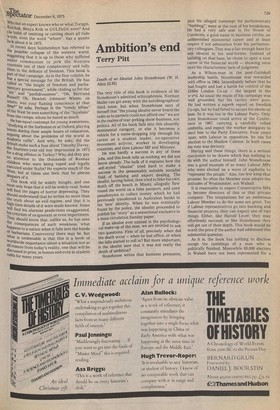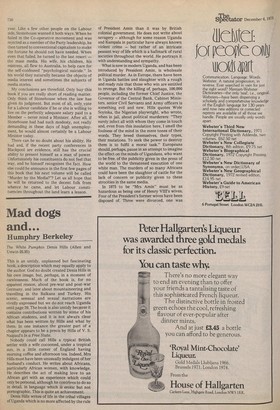Ambition's end
Terry Pitt
Death of an Idealist John Stonehouse (W. H. Allen £3.95) The very title of this book is evidence of Mr Stonehouse's admitted schizophrenia. Norman Mailer can get away with the autobiographical third tense, but when Stonehouse says of himself that "the young idealist never heard the radio as hs parents could not afford one" we are in the realms of tear-jerking show-business, not politics. All of his book falls into this absurdly sentimental category, or else it becomes a vehicle for a name-dropping trip through his career as a student leader, co-operative movement activist, worker in developing countries, and then Labour MP and Minister. He was hardly a success in any of these_ jobs, and this book tells us nothing we did not know already. The bulk of it explains how the self-styled "idealist" tried hard to make a success in the presumably suitable socialist field of banking and export dealing. The idealist, having failed, then tried to fake his own death off the beach in Miami, allegedly flew round the world on a false passport, and used pseudonyms to collect money which he had previously transferred to Australian banks in his `new' identity. When he was eventually found by the police, the idealist proceeded to publish his "story" as a sensational exclusive in a mass circulation Sunday paper. If an idealist ever existed in the psychological make-up of the man, we are entitled to ask two questions. First of all, precisely when did the death occur — when he lost office, or when the bills started to roll in? But more important, is the idealist sure that it was not really the death of ambition? Stonehouse writes that business pressures, plus his alleged contempt for parliamentary "humbug", were at the root of his breakdown. He had a very safe seat in the House of Commons, a good name in business circles, an
unblemished ministerial career and at least respect if not admiration from his parliamen
tary colleagues. That was a fair enough base for any idealist in his mid-forties. Instead of building on that base, he chose to open a new career in the financial world — showing once more his characteristic lack of judgment.
As a Wilson-man in the post-Gaitskell leadership battle, Stonehouse was rewarded with office in 1964. Immediately before that he had fought and lost a battle for control of the £100m London Co-op — the largest in the wyld. As usual the masis of his campaign was well grounded, but his tactics were poor. He had written a superb report on Swedish Co-ops, but he had failed to secure his electoral base. So it was too in the Labour Party. Only John Stonehouse could arrive at the Confer ence in 1967, carrying a carefully rolled umbrella, and expect the worker delegates to elect him to the Party Executive. Four years later, with Labour in opposition, he ran for election to the Shadow Cabinet. In both cases his vote was derisory.
Having said these things, there is a serious conclusion to be drawn which has nothing to do with the author himself. John Stonehouse was a good example of so many Labour MPs who were elected on a wave of euphoria to "represent the people." Alas, too few keep that promise. So often the Member soon adopts the attitudes of Westminster, not Walsall.
It is reasonable to expect Conservative MPs to become directors of this or that private company. The temptations for an ambitious Labour Member to do the same are great. Yet if Labour representatives go into banking and financial projects. they can expect one of two things. Either, like Harold Lever, they may effortlessly succeed; or like Stonehouse they will get out of their depth. This book would be worth the price if the author had addressed this substantial question.
As it is, the book has nothing to disclose except the ramblings of a man who is politically finished. Meanwhile 65,000 electors in Walsall have not been represented for a year. Like a few other people on the Labour side, Stonehouse wanted it both ways. When he failed in the Co-operative movement and was rejected as a member of the Party leadership, he then turned to conventional capitalism to make the fortune he should not have needed. When even that failed, he turned to the last resort — the mass media. His wife, his children, his mistress, all flew to Australia, to help care for the self-confessed "psychological suicide." In his world they naturally became the objects of media interest and sometimes the subjects of media stories.
My conclusions are threefold. Only buy this book if you are really short of reading matter. Only think of Stonehouse when the law has given its judgment. But most of all, only vote for a Labour candidate if he or she is willing to live on the perfectly adequate salary paid to a Member — never mind a Minister. After all, if Stonehouse had had such modesty, not really demanding in these days of high unemployment, he would almost certainly be a Labour Minister today.
There can be no doubt about his ability. He had and, if the recent party conferences in Blackpool are evidence, still has the crucial ability to present himself as a man of power. Unfortunately his constituents do not feel that way, and he himself recognises the fact. How else could he announce in the first few pages of this book that his next volume will be called "Murder by the Media?"? Let us all hope that he will be returned to the decent folk from whence he came, and let Labour constituencies throughout the land learn a lesson.


































 Previous page
Previous page